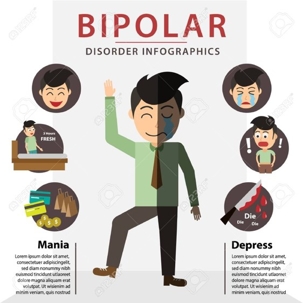Whether your spouse is experiencing manic highs or depressive lows, or if you’ve lived through unpredictable mood swings, impulsive spending, or emotional volatility, it’s important to approach a bipolar spouse for a divorce with both strategy and compassion.
Divorce is complex, unpredictable and never easy, but when your spouse has bipolar disorder, the emotional, legal, and practical challenges can feel overwhelming. As a medically trained divorce attorney and mediator for ever 35 years, I have helped many clients navigate this very delicate situation.
The good news is, you can divorce a bipolar partner safely, successfully, and with your dignity intact. The key lies in understanding your options whether it be mediation or litigation, and choosing the path that best supports your emotional health and legal goals.
Understanding Bipolar Disorder and Its Impact on Divorce
Bipolar disorder is a mental health condition characterized by extreme mood swings that include emotional highs (mania or hypomania) and lows (depression).
These fluctuations can profoundly affect a relationship and often lead to:
- Impulsive financial decisions such as overspending, gambling, or risky investments.
- Periods of anger or verbal abuse, followed by guilt or withdrawal.
- Neglect of household or parental responsibilities during depressive episodes.
- Erratic communication or unrealistic expectations about reconciliation.
- Manipulative or narcissistic tendencies that emerge during manic states.
When bipolar symptoms go untreated, a marriage can become emotionally unsafe or financially unstable. Recognizing these behaviors is not about blame, it’s about protecting yourself and your future.
Step One: Prioritize Safety and Stability
If your partner’s behavior has become abusive, threatening, or unpredictable, your safety, and your children’s safety comes first.
You may need to consider:
- Temporary orders of protection if there is violence or harassment.
- Secure living arrangements away from the marital home.
- Documenting incidents of erratic or abusive conduct.
- Consulting a therapist who understands bipolar disorder and domestic dynamics.
As an attorney with a psychological background, I often help clients develop a safety plan that protects them emotionally and legally before filing for divorce.
Step Two: Choosing Between Mediation or Litigation
The next crucial step is determining whether mediation or litigation is the right approach for your situation.
Mediation:
Mediation can be a powerful, less adversarial solution when your bipolar spouse is stable, compliant with treatment, and able to communicate respectfully.
Through structured conversations, guided by an experienced mediator like myself, you can work together to resolve key issues such as:
- Division of property and finances
- Parenting schedules and custody arrangements
- Spousal and child support
- Long-term communication strategies
Benefits of Mediation:
- Private and confidential: avoids public courtroom drama.
- Cost-effective: saves thousands in legal fees.
- Emotionally supportive: reduces conflict and promotes healing.
- Customizable: agreements are tailored to the mental health realities of your family.
I often incorporate psychological insight into my mediation sessions, helping both spouses communicate more effectively even when emotions are high. With the right structure, mediation can bring calm, clarity, and closure to a turbulent relationship.
Litigation:
However, if your bipolar partner is non-compliant, manipulative, or abusive, litigation may be a better route.
In these cases, your I, along with my team must ensure:
- Financial transparency: manic spending or hidden accounts are investigated.
- Custody protection: a child’s emotional safety is prioritized.
- Evidence documentation: medical reports, text messages, or witnesses support your claims.
- Protective court orders: safeguard against erratic or harmful behavior.
Litigation allows the court to step in and impose boundaries your spouse cannot or will not maintain.
With over 35 years of experience, I know when to shift from a cooperative tone to an assertive courtroom strategy to ensure your rights and peace of mind are fully protected.
Examples of Bipolar Behavior in Divorce Situations
Recognizing bipolar-related behavior can help you anticipate challenges and prepare a strategy. Some examples I’ve encountered in my cases include:
- Manic episodes where a spouse empties joint accounts to fund a “business idea” or lavish shopping spree.
- Depressive withdrawal, refusing to sign papers or attend court dates, stalling progress.
- Emotional manipulation, alternating between love-bombing and verbal aggression.
- Impulsive custody demands seeking full custody one week, then disappearing the next.
- Public outbursts or online harassment, damaging reputations or co-parenting relationships.
Understanding that these actions stem from a mental health condition allows you and your legal team to respond strategically rather than react emotionally
Protecting Your Finances
During manic phases, individuals with bipolar disorder may engage in risky financial behavior that can devastate family assets.
Steps I suggest a client take to protect themselves include:
- Monitoring bank and credit accounts for unusual transactions.
- Collecting financial documents before separation.
- Working with a forensic accountant, if necessary.
- Freezing joint credit cards or establishing separate accounts early in the process.
In mediation, we can address these issues constructively. In litigation, we can obtain court-ordered financial disclosures to ensure fairness.
Co-Parenting with a Bipolar Spouse
When children are involved, it’s vital to create a parenting plan that considers the realities of bipolar disorder.
When developing a plan I often include:
- Structured visitation schedules that provide consistency.
- Requirements for medication compliance or therapy participation.
- Emergency protocols for episodes of instability.
- Parenting coordinators or therapists as neutral third parties.
As a mediator, I help parents craft child-focused agreements that protect kids while maintaining meaningful relationships with both parents whenever possible.

What sets my approach apart is the integration of legal expertise and psychological insight.
Having trained in both law and psychiatry, I understand the emotional undercurrents that fuel high-conflict divorces involving mental illness.
My unique, comprehensive method focuses on:
- Encouraging emotional regulation during negotiations.
- Teaching clients communication strategies that prevent escalation.
- Providing mental-health-aware solutions in both mediation and litigation.
- Building a roadmap to recovery, not just legal resolution.
Whether through calm mediation or assertive litigation, my goal is always the same: to help you divorce intelligently, safely, and with empathy.
If you are considering divorcing a bipolar spouse, you don’t have to face it alone. Seek help from professionals, like us, who understand both the legal and emotional complexities of mental health in marriage.
Divorcing a bipolar spouse requires patience, protection, and a plan. With the right guidance, you can achieve a resolution that safeguards your emotional well-being, your children, and your future.
Remember, you can move forward without chaos or fear.
With a compassionate, strategic expert by your side, peace and freedom are possible.
I offer free consultations where we explore your unique circumstances and determine whether mediation or litigation is right for you. Every case is different, and the right strategy depends on your partner’s condition, your safety, and your financial stability.
Call me nowto schedule your free consultationif you’re facing a divorce involving bipolar disorder, I can help. Call 212.734.1551
I look forward to speaking with you.
Warm wishes,
Lois

